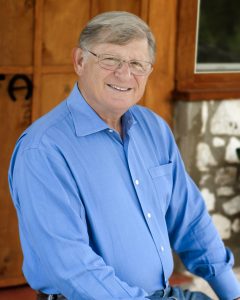
Dr. Tom Hutton’s first “non-technical” book chronicles stories from his career as a neurologist working with patients. Photo by James Fox.
Mar 8, 2017–About eight years ago I was invited to be a guest at a writer’s group.
As they discussed and critiqued each other’s writing, I was drawn into the process. For the first time I felt that I, too, could get a book into print.
(I did, too. It’s called Finding Fredericksburg: A self-guided tour of historic Fredericksburg, Texas. Shameless plug below.)
One of the writers in that group, Tom Hutton, was a retired neurologist working on his first “non technical” book.
Unlike the rest of us, he had a real publisher. Last year, Texas Tech University Press published Carrying the Black Bag: A Neurologist’s Bedside Tales. It is a compilation of stories distilled from his thirty-plus years of practice in West Texas and Minnesota. Part memoir and part tribute to his patients, the book describes his patients’ courage, grace, dignity, resilience, and yes, humor, when facing major medical conditions.
Writing is not a new passion for Hutton, who had already published eight professional books and over 100 articles. But in those works, he had never used a simile or metaphor and “never written a line of dialogue in my life.”
“Writing is something I’ve toyed with for some time now,” he said. “I loved literature in college, but was always so busy I couldn’t write much except for medical science journals.”
Other than occasionally trying to sneak a “rhetorical flourish” into his work, he didn’t dabble in non-technical writing until the end of his professional career, when he penned caregiver’s guides for family members dealing with Alzheimer patients. It was a change from writing technical articles “crammed with lots of turgid science facts.”
“I found myself writing for patients and practical things, rather than theoretical topics,” said Hutton, who admitted it was a challenge to change styles. “I had to get rid of the passive voice.”
The desire to become an author rather than a writer stayed with him. When he entered the transition from work to retirement, Hutton started taking writing classes, including some at Hill Country University Center. Along with several classmates, he formed a weekly writers group, the one I eventually visited. Just as they helped me, they helped him.
“The key is to try to find group of people with enough trust to share their writing, and enough tact to give a proper and helpful critique,” he said. The group also gave him valuable nonverbal feedback. “They were mostly not scientific people. When I saw their eyes cross, I thought, well, that’s not going to work, let’s change the phrasing.”
Given his lifelong experience talking with patients, Hutton knew how to take complex scientific content and put it in a way the layperson understood.
It was still a big job. During his busy practice times, Hutton would keep consults and make notes, but it wasn’t until he moved to Fredericksburg that he was able to go back to the two-foot high pile of paper and enlarge on the stories. Then, he was meticulous in his editing. Some chapters got rewritten 20 times.
“The first six or seven times I didn’t like them,” he said. “By revision 10, it became tolerable. Then it started sparkling a little bit. That’s how my creative process works.”
Although retired, Hutton and his wife, Trudy, are engaged in many community causes and groups, including taking the lead in establishing Texas Tech’s OLLI lifelong learning program in the Hill Country, a nice closing of the circle back to where he first took writing classes.
He is already well along on several other books, including one on Hutton’s theory that Parkinson’s disease played a role in Hitler’s thought processes, aiding the Allies at the Battle of Normandy, and another with a working title of Bandit’s Gift, about the role their border collie played in leading them to Fredericksburg.
For now, he is satisfied with the response to Carrying the Black Bag.
“I’ve so much enjoyed visiting with people who have read the book,” he said, echoing every author’s appreciation of feedback. “The immediate gratification is wonderful, as these are people I’ve spent a lifetime trying to help. So many of my patients were memorable for their courage and hopefulness, and the humor they demonstrated. One reviewer summed it up as ‘part memoir, part love story of a doctor for his patients.”
He is working on getting it out to a larger audience. No matter the ultimate sales, Carrying The Black Bag has had an impact on one person–the author.
“I’ve had tremendous satisfaction publishing this book and reliving some of these events,” he said. “I had a wonderful medical school professor who told us to never underestimate what we could learn from our patients. That is the recurring theme from this book.”
Details:
To find out more about how to get Carrying The Black Bag, visit tomhuttonmd.com.
Phil Houseal’s guide book Finding Fredericksburg is available in Fredericksburg TX at Remember Me, Too, the Gillespie County Historical Society, and the Nimitz Museum Bookstore, or online at Amazon.com.
Phil Houseal’s compilation of Full House columns Playing to a Full House: The People Who Make the Music of the Texas Hill Country comprises 60 profiles of the famous (Ray Price, Larry Gatlin, Michael Martin Murphey), Texas famous (Erik Hokannen, Ponty Bone, Jim Cullum, Stephanie Urbina Jones), and the Never Will Be Famous. Get it on Amazon!
Contact Phil at phil@fullhouseproductions.net, www.fullhousepr.com.